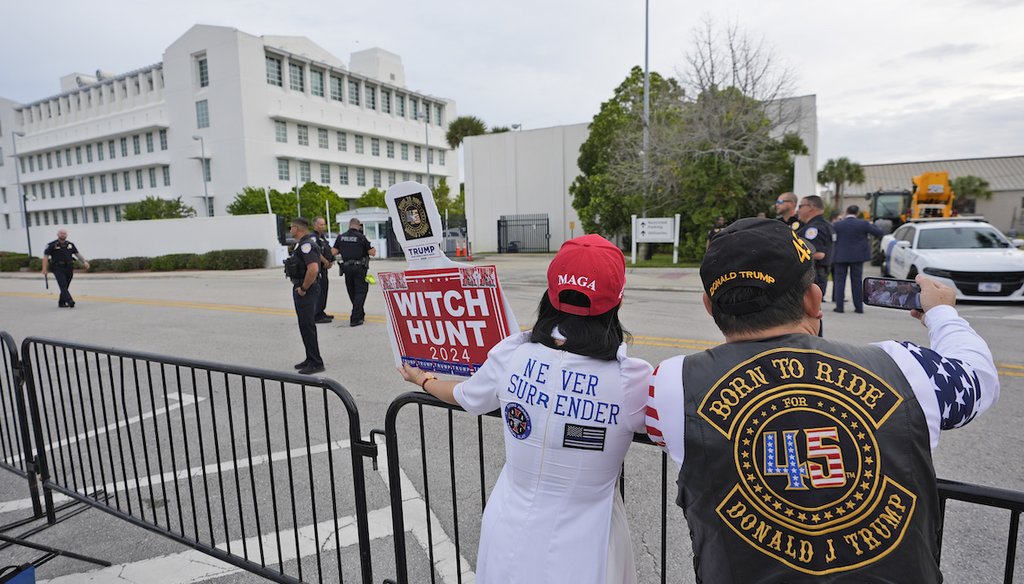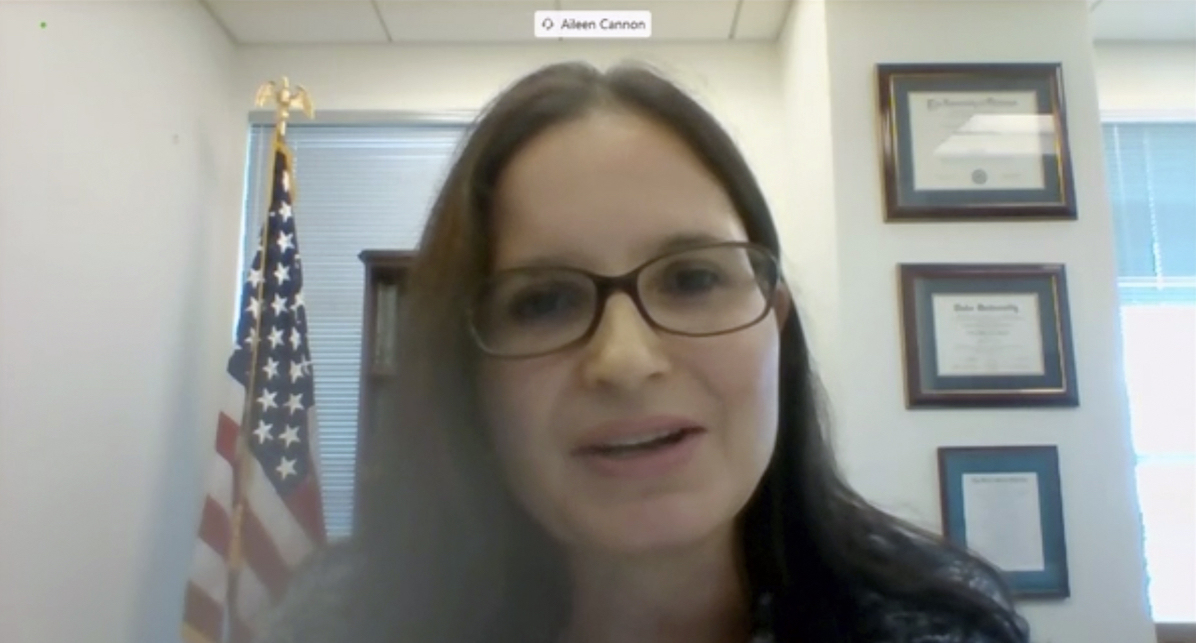Stand up for the facts!
Our only agenda is to publish the truth so you can be an informed participant in democracy.
We need your help.
I would like to contribute

Supporters of former President Donald Trump wait for his arrival at the Federal Courthouse March 1, 2024, in Fort Pierce, Fla., where his classified documents case was being heard. (AP)
U.S. District Judge Aileen Cannon on July 15 dismissed a 40-count federal indictment against former President Donald Trump on charges he mishandled classified documents, writing that the appointment of a special counsel in the case violated the U.S. Constitution.
Cannon wrote in an unexpected 93-page ruling that Special Counsel Jack Smith’s appointment violated the Consitution’s Appointments Clause because Smith wasn’t appointed by the president and confirmed by the U.S. Senate.
The special counsel’s office said it will appeal Cannon’s ruling, which came two days after the former president was wounded in an assassination attempt in Pennsylvania and on the same day the Republican National Convention began in Milwaukee.
U.S. Attorney General Merrick Garland appointed Smith Nov. 18, 2022, to oversee the case, and a grand jury indicted Trump on June 9. Trump was charged with 32 counts of willful retention of national defense information, obstructing justice and seven other charges.
Smith is also overseeing a separate federal case that charges Trump with interfering with the 2020 election. That case will likely be delayed given that the U.S. Supreme Court ruled presidents have immunity from criminal prosecution for "official acts."
Sign up for PolitiFact texts
Here’s what we know about how Cannon’s ruling could affect the classified documents case.
In this image from video provided by the U.S. Senate, Aileen M. Cannon speaks remotely during a Senate Judiciary Committee oversight nomination hearing to be U.S. District Court for the Southern District of Florida on July 29, 2020, in Washington. (U.S. Senate via AP)
Trump appointed Cannon to the United States District Court for the Southern District of Florida in late 2020.
She has made several rulings in the case that have been favorable to Trump, including delaying indefinitely the trial, which had been scheduled to begin May 20. Politico reported in April that her rulings have sparked tension between Smith and Cannon. Smith said she is entertaining arguments he described as "fiction"; Cannon said Smith’s move for a speedy trial was "unprecedented."
The clause — found in Article II, Section 2, Clause 2 — states that a president shall appoint officers of the United States "by and with the advice and consent of the Senate."
Cannon argued that under this clause, Smith is an officer of the United States and therefore should be appointed by the president and confirmed by the Senate.
"The bottom line is this: The Appointments Clause is a critical constitutional restriction stemming from the separation of powers, and it gives to Congress a considered role in determining the propriety of vesting appointment power for inferior officers," Cannon wrote. "The Special Counsel’s position effectively usurps that important legislative authority, transferring it to a Head of Department, and in the process threatening the structural liberty inherent in the separation of powers."
Supreme Court Justice Clarence Thomas foreshadowed this ruling in a concurring opinion in the presidential immunity ruling, writing that there is no law establishing the Special Counsel’s office and therefore Smith, who was a private citizen when he was tapped for the role, cannot criminally prosecute anyone. Smith would need to be confirmed by the Senate, Thomas wrote. Thomas cited the Appointments clause in his opinion, and Cannon cited his opinion in her ruling.
Cannon, in her ruling, delved into the long and disparate history of special counsel appointments, noting that some were appointed by presidents but the approach has been inconsistent, with private citizens and attorneys already working in government being tapped.
Garland appointed Smith to oversee two federal criminal cases against Trump: the classified documents case and an election interference case. Smith was appointed by an attorney general in the same way most special counsels have been appointed since 1999.
Garland, in his order appointing Smith, wrote that that the appointment was by "virtue of the authority vested in the attorney general," including sections 509, 510, 515 and 533 of Title 28, Chapter 31 in the U.S. Code. Those sections come from a part of the U.S. Code that governs the federal judicial system and lays out the attorney general’s broad authority. Garland added that several parts of the special counsel regulations were applicable to Smith.
Title 28 of the Code of Federal Regulations outlines the attorney general’s powers. Regulations detailing the powers of a special counsel are outlined in Part 600 of the federal code.
The Justice Department created the regulations detailing the special counsel powers in 1999 after a an ethics law Congress passed in 1978 expired. That law, passed after the Watergate scandal, allowed an attorney general to request that a three-judge panel from the U.S. Court of Appeals appoint an independent counsel to investigate a case. No federal law currently governs special counsel appointments.
Like Smith, other special counsels were appointed by attorneys general citing the same authority and codes:
-
Garland cited the same authority and codes in his appointments of Robert Hur, the special counsel who investigated President Joe Biden’s handling of classified documents, and David Weiss, who is investigating the president’s son, Hunter Biden.
-
Mueller was appointed by Rosenstein, who cited the same powers. So did William Barr, who served as attorney general under Trump, in 2019 when he appointed special counsel John Durham, to investigate the origins of the Russia investigation.
-
In 2003, acting Attorney General James Comey cited the same authority when he named Patrick Fitzgerald special counsel to investigate the leaking of CIA agent Valerie Plame’s name.
-
In 1999, Attorney General Janet Reno appointed John Danforth as special counsel to investigate the government’s assault on the Branch Davidian compound in Waco, Texas, writing that Danforth "has been given the same authority as that which any Special Counsel would have under existing Special Counsel regulations."
Danforth was an exception to recent special counsel appointments, said Josh Blackman, a South Texas College of Law Houston professor. Blackman filed an amicus brief on behalf of groups who wanted Trump’s case dismissed and was among three attorneys who gave oral arguments in the matter in front of Cannon in June.
Danforth, a Republican and former U.S. Senator, "was not appointed pursuant to those regulations," Blackman said. "He was appointed to investigate, but it’s not clear he had prosecutorial powers."
"Most of the special counsels who were appointed (under the current regulations) were (current) United States attorneys, people confirmed by the Senate," said Blackman, who said Mueller was the first special counsel appointed from outside the government.
Like Smith, Hur also was appointed from outside the government.
Some courts have considered special counsels to be "inferior officers," which the Appointments Clause says can be appointed without Senate approval.
The Appointments Clause also states that Congress can give the power to appoint "inferior officers" to courts of law or department heads.
"Other courts that have considered this question have instead found a special counsel to be an ‘inferior officer’ that may be appointed by members of the executive branch without senate confirmation," said Barbara McQuade, a former U.S. attorney for Michigan’s eastern district in President Barack Obama’s administration and a University of Michigan law professor. "Therefore, the appointment of Smith by Attorney General Merrick Garland would be permissible."
In February 2019, a federal appeals court rejected a similar argument about the appointments clause in a case filed by Trump associates against the appointment of Special Counsel Robert Mueller in the Russia investigation. The judges in that case wrote that Mueller’s appointment was valid partly because he was supervised by an executive branch officer, Deputy Attorney General Rod Rosenstein, whom the Senate had confirmed.
"Several courts have addressed the constitutionality of the current regulations, and upheld them," said McQuade, who noted they were enacted to make a special counsel more accountable to the Justice Department than under previous rules. "Judge Cannon is the first to strike them down."
A special counsel’s office spokesperson said the office will appeal the ruling.
"The dismissal of the case deviates from the uniform conclusion of all previous courts to have considered the issue that the Attorney General is statutorily authorized to appoint a Special Counsel," said Peter Carr, a spokesperson for Smith’s office. "The Justice Department has authorized the Special Counsel to appeal the court’s order."
The appeal likely will go before the 11th Circuit Court, but Smith could appeal directly to the U.S. Supreme Court.
McQuade said an appeal gives Smith the opportunity to ask the court to reassign the case to a different trial judge. The case will likely end up before the Supreme Court, which could set it back by as much as a year, McQuade said.
Trump was charged with 40 counts in the Florida case. One of his aides and a Mar-a-Lago worker also were accused of helping Trump and faced charges, which are also now dropped.
Trump was accused of improperly keeping hundreds of documents at his Mar-a-Lago estate in Palm Beach, Florida, and obstructing efforts by the government to retrieve them.
-
32 counts of willful retention of national defense information
-
One count of conspiracy to obstruct justice
-
One count of withholding a document or record
-
One count of corruptly concealing a document or record
-
One count of concealing a document in a federal investigation
-
One count of scheme to conceal
-
One count of false statements and representations
-
One count of altering, destroying, mutilating or concealing an object
-
One count of corruptly altering, destroying, mutilating or concealing a document, record or other object.
As it stands, Cannon’s decision is not binding for the Washington, D.C., court handling Trump’s separate Jan. 6 case.
"If the Supreme Court were to strike down the special counsel regulations, then that would be binding on Jack Smith in the D.C. case as well," McQuade said.
It also may affect Hunter Biden’s case, McQuade said.
"If the Supreme Court were to strike down the independent counsel regulations, then that would affect any case filed by a special counsel that is in the pipeline," she said.
PolitiFact Staff Writer Amy Sherman contributed to this report.
Our Sources
Court Listener, Case No. 23-80101-CR-Cannon, July 15, 2024
U.S. Supreme Court, 23-939 Trump v. United States (07/01/2024), July 1, 2024
Constitution Annotated, ArtII.S2.C2.3.1 Overview of Appointments Clause, accessed July 15, 2024
Code of Federal Regulations, Part 600 — General Powers of Special Counsel, accessed July 15, 2024
Cornell Law School Legal Information Institute, 28 U.S. Code § 510 - Delegation of authority, accessed July 15, 2024
Email interview, Barbara McQuade, University of Michigan law professor, July 15, 2024
Phone interview, Josh Blackman, South Texas College of Law Houston professor, July 15, 2024
Emailed statement, Peter Carr, spokesperson for Special Counsel Jack Smith’s office, July 15, 2024
U.S. Justice Department, John Danforth appointment, Sept. 9, 1999
U.S. Justice Department, Patrick Fitzgerald appointment, Dec. 30, 2003
U.S. Department of Justice, Robert Mueller appointment, May 17, 2017
U.S. Department of Justice, John Durham appointment, Oct. 19, 2020
U.S. Department of Justice, Jack Smith appointment, Nov. 18, 2022
U.S. Department of Justice, Robert Hur appointment, Jan. 12, 2023
Office of the Attorney General, order appointing David Weiss, Aug. 11, 2023
The Associated Press, Federal judge dismisses Trump classified documents case over concerns with prosecutor’s appointment, July 15, 2024
The Washington Post, Trump’s classified documents case dismissed by Judge Aileen Cannon, July 15, 2024
The Washington Post, Thomas uses Trump immunity ruling to question Jack Smith appointment, July 1, 2024
The Washington Post, Special counsel Robert Mueller’s appointment is valid, federal appeals court rules, Feb. 26, 2019
Politico, Judge Cannon indefinitely postpones Trump’s classified docs trial, May 7, 2024
Politico, Tensions flare between special counsel Jack Smith and Judge Aileen Cannon, April 4, 2024
Newsweek, Aileen Cannon's New Trump Order Raises Eyebrows, June 4, 2024
PolitiFact, Trump guilty in NY trial: Can he still run for president or vote as a convicted felon?, May 31, 2024
PolitiFact, What Supreme Court’s immunity ruling means for Trump’s cases and, potentially, future presidents, July 2, 2024
PolitiFact, Is David Weiss’ special counsel appointment in Hunter Biden case legal? Experts explain, Aug. 22, 2023
PolitiFact, Read Donald Trump’s indictment in the Mar-a-Lago classified documents investigation, July 27, 2023

























